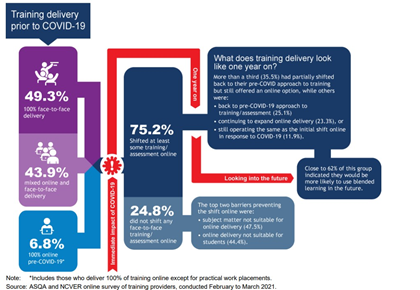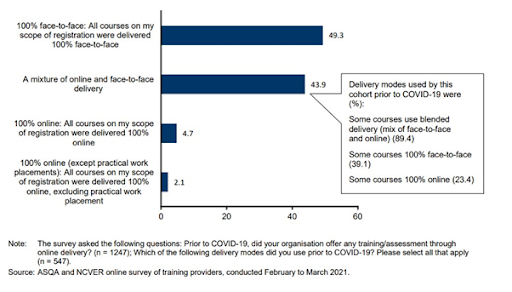
Australia’s five most powerful education leaders in 2021
AFR Magazine’s annual Power issue, out on Friday, October 1, includes lists of the key players across six industry sectors. Here the people topping teaching in a profound year for the sector.
For more information, please visit here.
New South Wales pilot plan ‘would expand and evolve’: minister
International students form long lines outside Melbourne foodbank
A food charity in Melbourne is helping international students hit hard by lockdowns, providing supplies for almost 2 thousand students a week.
For more information, please visit here.
NSW releases ‘return to VET’ guidelines, visit here.
CQUniversity Graduate Guarantee offers a fully flexible, Graduate Certificate in Leadership and Entrepreneurship, free of charge, to all domestic and international graduates
Announced today, the CQUniversity Graduate Guarantee offers a fully flexible, Graduate Certificate in Leadership and Entrepreneurship, free of charge, to all domestic and international graduates who haven’t secured full-time or part-time work within six months of finishing their undergraduate degree.
For more information, please visit here.
WA invests $31.7 million in in-house career counsellors
The Western Australian government has announced it will be deploying ‘career practitioners’ across 70 high schools in the state next year to help students explore work and study options after graduating.
Education and training minister Sue Ellery announced the multi-million dollar initiative on Wednesday, saying that it would help set students up for successful futures.
For more information, please visit here.
Education & Training Market is Booming Worldwide
The latest published market study on Global Education & Training Market provides an overview of the current market dynamics in the Education & Training space, as well as what our survey respondents—all outsourcing decision-makers—predict the market will look like in 2027. The study breaks the market by revenue and volume (wherever applicable) and price history to estimate size and trend analysis and identify gaps and opportunities. Some of the players that are in coverage of the study are Kaplan, ITT Educational Services, QA, Interaction Associates, Benesse Corporation, Osiris Educational, Abu Dhabi Vocational Education and Training Institute, Global Training Solutions, Apollo Education Group, Computer Generated Solutions, Desire2Learn, NIIT, Career Education Corporation (CEC), New Horizons Computer Learning Centers, New Oriental Education & Technology Group & Creative Education.
For more information, please visit here.
$1m donation expands Australia’s only nuclear engineering program
The nuclear engineering program prepares students for careers in high-tech industries including nuclear science, nuclear medicine, mining and resources, energy, manufacturing, aerospace, space exploration and defence.
The funding aims to support scholarships for approximately 20 domestic students to obtain a master’s degree in Nuclear Engineering from UNSW’s School of Mechanical and Manufacturing Engineering, along with top-up scholarships and research expenses for research students. Funding will also support work placements with industry partners and other professional development opportunities for the Tyree Scholars.
For more information, please visit here.
ASQA approves extended transition period for a number of courses
ASQA has approved an extended transition period to a number of courses, including 52707WA Graduate Diploma of Dermal Therapies, 52709WA Graduate Diploma of Cosmetic. CPC30318 Certificate III in Concreting, HLT21015 Certificate II in Medical Service First Response, HLT31015 Certificate III in Ambulance Communication (Call Taking), HLT31115 Certificate III in Non-Emergency Patient Transport, HLT41015 Certificate IV in Ambulance Communications (Dispatch), HLT41115 Certificate IV in Health Care, HLT51015 Diploma of Paramedical Science, BSB52415 – Diploma of Marketing and Communication, BSB52215 – Diploma of Legal Services, BSB50815 – Diploma of International Business, BSB50618 – Diploma of Human Resources Management, BSB50415 – Diploma of Business Administration, BSB50215 – Diploma of Business, BSB40515 – Certificate IV in Business Administration, BSB40215 – Certificate IV in Business, BSB31215 – Certificate III in Library and Information Services, BSB31115 – Certificate III in Business Administration (Medical), BSB31015 – Certificate III in Business Administration (Legal), BSB30415 – Certificate III in Business Administration, BSB30115 – Certificate III in Business.
You will be able to find the complete list by visiting www.asqa.gov.au/rto
Benefits of virtual exchange programmes for international students
Moving halfway across the world isn’t the only way to reap the benefits of exchange programmes. Virtual exchange programmes — where participants connect with peers and institutions from anywhere in the world — achieve the same perks, like meeting new people, breaking down tired cultural stereotypes and bringing classroom learning to life.
For more information, please visit here.
New Standards for Course Accreditation for Western Australia RTOs
Course accreditation is the formal recognition of a course by an accrediting body. In Western Australia, the course accrediting body is the Training Accreditation Council (TAC or the Council). Accredited courses fill a gap in skill requirements that are not covered by national industry training package qualifications. They must be developed in accordance with the AQTF2021 Standards for Accredited Courses
For more information, please visit here.
Offshore learning hubs keep overseas students engaged
Universities in Australia and New Zealand, where borders have remained closed to international students for over 18 months, have found innovative ways to keep online learners engaged by setting up special learning centres in China.
And student ‘hubs’ elsewhere in Asia are supporting students enrolled in different universities overseas, and who would otherwise be isolated at home with online learning.
For more information, please visit here.
MIT tops QS employability ranking 2022
Global higher education analyst Quacquarelli Symonds has named the Massachusetts Institute of Technology in the US as the leader of its graduate employability ranking for a second year in a row.
For more information, please visit here.
Is blended delivery the future of Australian VET education?
A research by Sheila Hume and Tabatha Griffin, NCVER demonstrate that there was a strong response from the VET sector to COVID-19 restrictions, with the number of subjects delivered online increasing by about 24% between 2019 and 2020. The research reported that the shift to online training delivery was more pronounced for government-funded subject enrolments than for those funded via domestic fee-for-service arrangements (increases of 40.4% and 15.7%, respectively).
Now and into the future
Approximately 12 months after the commencement of COVID-19 restrictions in Australia, only about one quarter (25.1%) of the surveyed RTOs who had transferred some face-to-face training online had reverted fully to their pre-COVID-19 approach to training.
The survey findings demonstrate a strong pattern of RTOs continuing to offer online training in areas where it was not available prior to COVID-19. More than one-third (35.5%) of respondents had only partially returned to their pre-COVID-19 approach to training delivery, while 23.3% were expanding online delivery, with a further 11.9% continuing to operate at the same level as their initial shift online.
More than 61% of RTOs who transitioned to at least some training online in response to COVID-19 indicated they would be more likely to use blended learning in the future
The ongoing and increased level of online delivery identified through the survey is reflected in the plans held by many survey respondents.
Who pays and the relationship to online delivery?
The overall increase of online training has coincided with a substantial rise in the number of governments funded online-only subject enrolments, with these enrolments increasing by almost 362 600 in 2020 (an increase of 40.4%; table 3).
Overview of training provider response.
COVID-19 has had an undeniable impact on the VET sector, with the significant and rapid transition to online learning early in the pandemic establishing the groundwork for and influencing the likelihood of RTOs using more blended learning in the future, as outlined in the below figure.

Delivery of training before and during COVID-19
Although there was a substantial transition (75.2%) to partial or full online delivery in response to COVID-19 (see the below table), more than half (52.5%) of the RTOs who did not (or could not) move any face-to-face training or assessment online had to suspend either full programs or certain subjects/units.
This issue raises the question of the immediate and longer-term impacts of these suspensions on students and, potentially, on RTO viability. Among those who did not move any training online, the main barriers preventing a transition were identified as unsuitable subject matter (47.5%) and the unsuitability of online delivery for students (44.4%). The next stage of this project will explore these issues in more depth through interviews with RTO staff
Incidence of shifting face-to-face training online in response to COVID-19, and barriers to shifting among those who did not move any training or assessment online (%)

Influence of COVID-19 on future plans
Training providers indicated a strong interest in incorporating more online training in the future, with 61.8% of those who moved some training online in response to the pandemic confirming that they were likely to use more blended learning in the future.
In addition, other plans to expand online learning in the future included:
- likely to permanently shift more units/parts of qualifications online (22.1%)
- likely to permanently shift more full qualifications online (10.6%)
Influence of COVID-19 on future online training delivery plans (%)

All content from The online delivery of VET during COVID-19: Research Report by Sheila Hume & Tabatha Griffin. National Centre for Vocational Education Research




Recent Comments